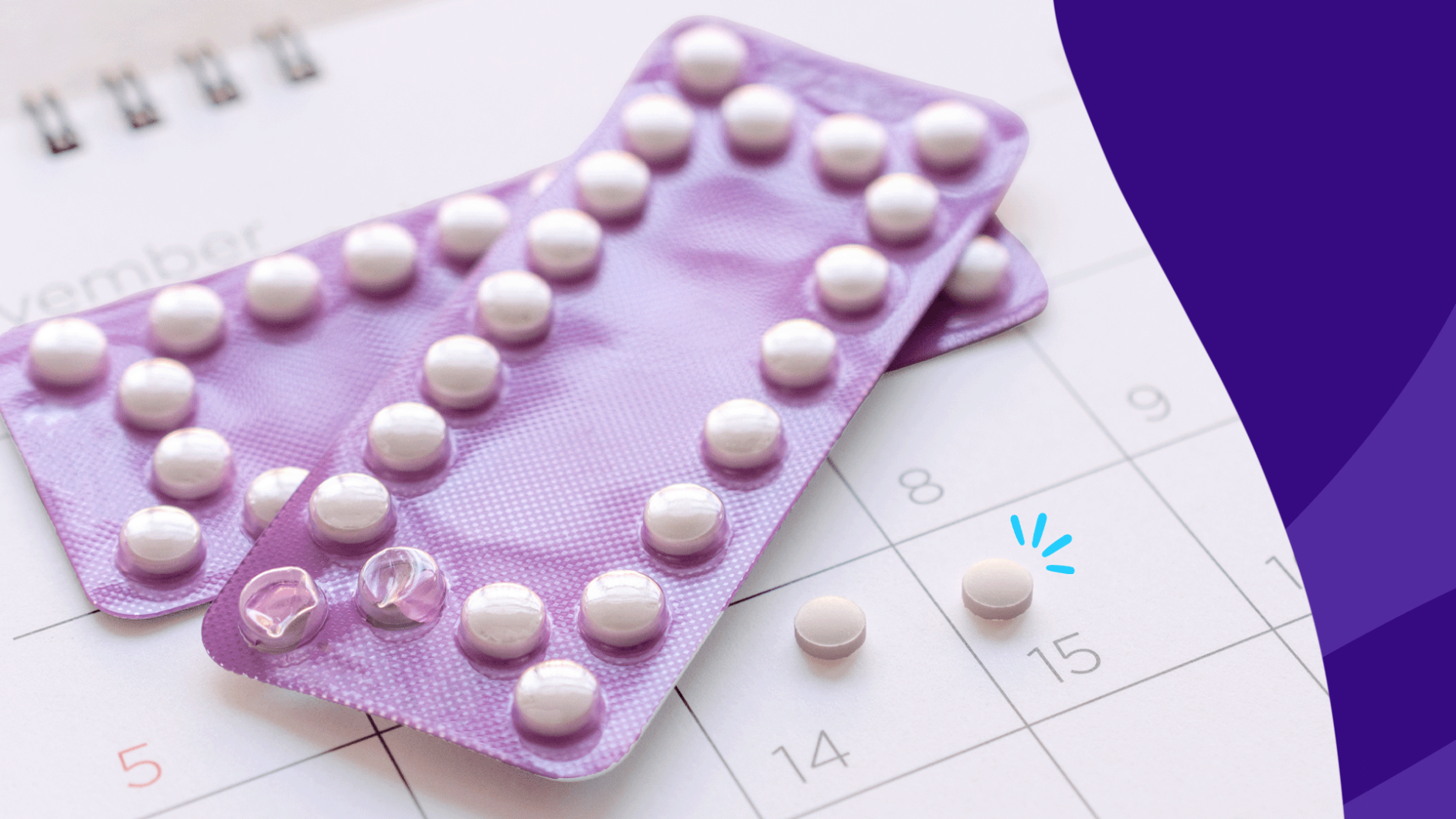Birth control failure is much more serious than a Tylenol that hasn’t quite cured your headache. If your hormonal contraception doesn’t work, then you’re at higher risk of an unplanned pregnancy. So, it’s important to be aware of any medications that may interfere with the effectiveness of hormonal birth control pills.
Before you take any new medication, consult with your healthcare provider or pharmacist about drug interactions to see if the medication could interfere with your birth control pills.
11 medications that interfere with birth control
The following details what can interfere with birth control pills and their effectiveness.
1. Antibiotics
There are a variety of antibiotics, and they’re prescribed for a number of reasons. While many antibiotics don’t interfere with birth control pills, some do. If you are taking oral contraceptives containing ethinyl estradiol, many antibiotics may decrease its effectiveness. And research shows that the antibiotic rifampin is known to interfere with birth control pill effectiveness.
“Antibiotics, especially rifampin, are thought to affect the absorption of birth control pills because they alter the environment of the stomach,” says Kristi C. Torres, Pharm.D., a member of SingleCare’s Medical Review Board.
But since you could get pregnant if the antibiotic does interfere, you are safest using backup birth control options (such as a barrier method) or emergency contraception (if needed) when taking antibiotics and birth control.
2. Anti-HIV drugs
Research shows that some antiretrovirals that are used to treat HIV can make your birth control less effective. Sustiva (efavirenz), as an example, was shown to compromise effectiveness. Other medications, including Atripla, Symfi, and Symfi Lo, also contain efavirenz as an ingredient and can affect the efficacy of birth control pills. Check with your healthcare provider before taking an anti-HIV treatment alongside birth control pills.
3. Antifungal medications
Certain oral or intravenous antifungal medications could cause your birth control pills to be less effective. Gris-peg (griseofulvin)—used to treat jock itch, ringworm, or athlete’s foot—particularly can interact with oral contraceptives. Women should use another form of birth control for up to one month after the last dose of griseofulvin.
Antifungal ointments, creams, and powders that you apply to the skin do not interfere with oral contraception.
“Antifungals such as fluconazole and itraconazole inhibit the enzyme that is partially responsible for the metabolism of birth control pills,” Dr. Torres says. “This could potentially lead to increased plasma concentrations of estrogen. This could result in nausea and breast tenderness. Short courses of antifungals may not present a clinically significant problem, but longer courses may present more of a concern.”
If you’re picking up a prescription for an ailment like a yeast infection, or the infections mentioned above, check with the pharmacist first to make sure it won’t affect the birth control you use.
4. Anticonvulsants
Medications that treat seizures, or ones that are used by individuals who have epilepsy, have been known to interfere with birth control pills. “Topamax, or generic topiramate, commonly used for both migraine prophylaxis and seizures, may also render your birth control less effective,” Dr. Torres says. Other anticonvulsants that can affect birth control include Tegretol (carbamazepine), Dilantin (phenytoin), phenobarbital, Trileptal (oxcarbazepine), and Lamictal (lamotrigine), among others. Check with your healthcare provider for medical advice if you take an anticonvulsant and birth control.
5. General anesthesia
If you are having any procedure done that requires anesthesia, it is important to let the surgeon know that you take birth control pills, since it may interfere with the effectiveness.
“Sugammadex is used to reverse neuromuscular blockages involved with surgical procedures,” says Taylor Graber, MD, a resident anesthesiologist at University of California San Diego and owner of ASAP IVs. “One of the side effects of this medication is that it binds to and temporarily inhibits birth control medications.” Women will need to use a non-hormonal backup form of birth control for seven days after receiving sugammadex.
6. Anti-nausea medications
Research shows that Emend (aprepitant), a medication that blocks the chemicals that cause nausea, can interfere with birth control effectiveness. Women will need to use a non-hormonal backup form of birth control while taking Emend, and for one month after taking Emend.
It’s also important to note: If you vomit after taking your regular dose of birth control, it may not have been fully absorbed. Treat it like a missed dose and use a backup contraceptive until you’re fully protected again.
7. Pulmonary hypertension medication
Tracleer (bosentan) is a medication used to treat people who have high blood pressure of the lungs. This medication may interfere with birth control effectiveness by decreasing the hormone levels in the blood. It also carries the risk of severe birth defects, so it’s recommended that any woman taking it use two methods of birth control. Women can consult their healthcare provider for guidance when choosing two effective methods of birth control.
8. Diabetes medications
Research has shown that Actos (pioglitazone), or combination drugs that contain pioglitazone, a diabetes medication, may decrease birth control pill effectiveness. Talk to your endocrinologist or OB-GYN to find out if there are alternative treatment methods. Women who do take pioglitazone along with birth control pills will need to use a non-hormonal backup form of birth control while taking pioglitazone, and for one month after taking pioglitazone.
9. Herbal supplements and vitamins
There are several types of supplements that could interfere with birth control.
- St. John’s wort is a supplement that people take to help with symptoms of depression, insomnia, or anxiety. “There is some thought that St. John’s Wort, typically used to help with symptoms of depression, contains ingredients which may speed up the breakdown of estrogen, rendering birth control less effective,” Dr. Torres says.
- “Vitamin C, often taken to boost immune function, can interact with birth control as well,” Dr. Torres says. High doses of Vitamin C can cause increases in estrogen, which Dr. Torres says could potentially be problematic.
- A melatonin supplement, taken at night to help you sleep or for jet lag, may interfere with hormonal birth control, but there’s not enough scientific evidence to know for sure. To be safe, talk to your health care provider before combining the two.
10. NSAIDs
If you are taking oral contraceptives that contain the progestin drospirenone, such as Gianvi, Loryna, Nikki, Ocella, Syeda, Slynd, Vestura, Yasmin, YAZ, or Zarah, it’s a good idea to watch your use of the NSAIDs ibuprofen or naproxen. That’s because if you take these medicines regularly, or every day, with drospirenone, your blood levels of potassium can rise to dangerous levels, leading to heart problems and other health issues. But if you’re not feeling well, Tylenol (acetaminophen) and cold medications like Sudafed won’t interact with your birth control pills. Ask your healthcare provider or pharmacist if you need help selecting an OTC medicine that does not contain an NSAID.
11. Laxatives
Taking laxatives or products like detox teas that increase the frequency of bowel movements can reduce the effectiveness of birth control pills. That’s because your body doesn’t have the chance to fully absorb the medication–so if you use medications or supplements that speed up the passage of waste from your intestines, it’s a good idea to use a backup method of contraception like condoms.
RELATED: 6 types of medications that could have a vitamin interaction
Other things that may make birth control less effective
Additional factors that may cancel out hormonal birth control include:
- Imperfect use of birth control—with perfect use, birth control pills are 99% effective, but missing one or more active pills during your menstrual cycle makes you more likely to get pregnant. This goes for other forms of hormonal contraceptives too. For example, not getting a contraceptive shot on time or forgetting to insert a new vaginal ring (or apply a patch) can make the birth control less effective.
- Vomiting and diarrhea, especially for more than two days, can reduce the effectiveness of oral contraceptives because the medication is not fully absorbed by the body.
- Not storing your pills at room temperature–keeping your medication too hot or too cold can make it less effective, so check the label for storage information.
Additionally, some options are better than others for women with higher BMIs. The emergency contraceptive Plan B (levonorgestrel) is most effective for women with a BMI less than 25, and is not considered effective in women with obesity. The emergency contraceptive Ella (ulipristal acetate) is most effective for women with a BMI of 30 or less—it’s not effective in women with a BMI of 35 or more. For obese women, another form of birth control like an intrauterine device (IUD), implant, or a drosperinone-containing birth control like Slynd may be a better choice to avoid an unplanned pregnancy.
How to prevent birth control ineffectiveness
Always talk with your doctor about birth control interactions before taking new medications, including vitamins or over-the-counter medications. Ask if the medication or supplement will interfere with your birth control effectiveness. Even if more research is needed, it’s generally better to err on the side of caution. You can use non-hormonal backup forms of birth control in addition to oral contraceptives when taking one of the number of medications known to lower effectiveness of oral contraceptives. Consult your healthcare provider if you need help selecting effective/backup forms of birth control.
If you forget to use a backup method, you can take over-the-counter emergency contraception as soon as possible after unprotected sex, up to five days after intercourse. For long-term medications, such as retrovirals, certain diabetes medications, or anticonvulsants, it is best to talk with your provider about other contraception methods, such as IUDs, implants, vaginal rings, and certain types of oral birth control that are more effective across a larger range of weights.
Sources
- Emergency Contraception, Office on Women’s Health
- Drug interactions between hormonal contraceptives and antiretrovirals, AIDS (2017)
- Griseofulvin (Oral Route), The Mayo Clinic (2024)
- Antiepileptic Drugs and Contraception, Neurology (2014)
- Aprepitant and fosaprepitant decrease the effectiveness of hormonal contraceptives, British Journal of Clinical Pharmacology (2017)
- Medication Guide Tracleer (tra-KLEER) (bosentan), AccessFDA
- Clinically and pharmacologically relevant interactions of antidiabetic drugs, Sage Journals (2016)
- Does Melatonin Affect Birth Control? Sleep Foundation (2023)
- The Pill, Penn State Student Affairs
- Hyperkalemia (high potassium), National Kidney Foundation
- Will medication make my birth control pills ineffective? Planned Parenthood (2020)
- I’m currently taking birth control. Is it okay for me to use laxatives? Planned Parenthood (2020)
- Birth control pill FAQ: Benefits, risks and choices, Mayo Clinic (2023)
- Emergency Contraception, Planned Parenthood of Michigan
- Obesity and hormonal contraceptive efficacy, Women’s Health (2014)
- Contraception, Centers of Disease Control and Prevention (2023)











